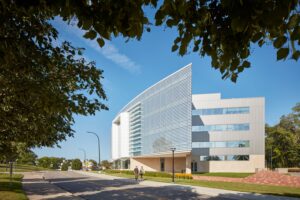
Laprisha Berry Daniels, Executive Director of Detroiters Working for Environmental Justice, Shares Insights

LAPRISHA BERRY DANIELS IS EXECUTIVE DIRECTOR OF DETROITERS WORKING FOR ENVIRONMENTAL JUSTICE AND A LEADERSHIP COMMITTEE MEMBER FOR SUSTAINABLE BUSINESS NETWORK DETROIT
DWEJ’s vision for sustainability is rooted in the three pillars of sustainability: health and happiness of community members, a healthy local environment free from hazards and harm, and economic vitality.
As an organization that focuses on environmental justice and strives to have the voice of the community-centered as decisions are being made that impact their health (physical, mental, spiritual, and economic), we assert that community members can envision and create healthy communities that meet their immediate and distal needs.

A healthy community is one in which all systems work together to support the health and well-being of all its members. Local businesses are part of the community’s ecosystem and thus play a unique role in supporting the health and well-being of the community. Ideally, the relationship between community members and local business is mutually beneficial as they prioritize health and co-create a healthy community. Local businesses and community members can work together to identify threats to community well-being and create strategies to address challenges.
In Detroit, and beyond, climate change threatens our ability to achieve and maintain physical, mental, spiritual, and economic health. As we experience more extreme weather locally, such as extreme heat and annual “100-year floods”, we recognize that our built environment may not be able to weather the storm (pun intended). Unfortunately, our existing residential housing stock and current construction practices are too often ill-suited for current and future climate conditions. The mismatch between what is available and what is needed creates threats to the health of people and planet.
DWEJ developed a contractor accelerator program that focuses on contractors increasing their awareness about ways to improve the built environment to mitigate risks related to climate change while centering sustainability. DWEJ’s contractor accelerator program, Building Health, serves as an incubator to support peer-to-peer learning among Detroit-based, Detroit-serving contractors of color. Building Health increases contractors’ awareness and implementation of “environmentally responsible and resource-efficient” practices that have:
- Bottom-line business benefits
- Individual and community health benefits
- Decrease environmental degradation.
Building Health increases contractors’ understanding of the impact they can have on health. For example, participating contractors are presented with strategies for upgrading and greening residential housing in ways that include the use of various building methods and materials that can make homes more energy efficient. These improvements decrease greenhouse gas emissions, improve the health and comfort of the home, and improve the economic health of the occupants by reducing the cost of utility use. Participants receive financial and technical assistance to implement practices as part of the program as well. Additionally, contractors learn how to best communicate the benefits of sustainable repair and rehab practices to clients.
The role of local contractors is just one example of the opportunity our community has to transform our ecosystem and economy for the better. There is a unique and distinct role that local business plays in supporting people and planet. Sustainability is an iterative process where we must work collectively toward the goal of having healthy and vibrant places in which to live, learn, work, play, and pray.
—
Check out Laprisha Berry Daniels’s recent #TEDTalks: Lessons from the Past on Adapting to Climate Change
Be sure to subscribe to our newsletter for regular updates on sustainable business practices in and around Detroit.
Guest
- All
- Business
- Community
- Education
- Events

ZF Group, a global technology company with its North American headquarters in Northville, specializes in systems for passenger cars, commercial vehicles, and industrial technology. With a focus on next-generation mobility, the company develops solutions that address electrification, automation, and digitalization while aiming to improve safety, efficiency, and sustainability in transportation. SBN Detroit interviewed Anuj Shah, Sustainability Lead, for the Americas, to explore the most pressing environmental challenges in...

The Chip Bag Project, based in Detroit, is a sustainability initiative that upcycles hard-to-recycle snack packaging — particularly chip bags — into insulated sleeping bags for individuals experiencing homelessness. Founded by Eradajere Oleita, the project addresses both environmental waste and housing insecurity by transforming materials like Mylar into practical, thermally efficient solutions. In June, Oleita was among Trelllis’s 30 Under 30, its annual recognition of the brightest young...

PowerPanel, headquartered in Oxford, focuses on sustainable energy technology with a particular emphasis on hot water systems and thermal energy capture. The company designs and manufactures modular solar hybrid systems that integrate both photovoltaic and thermal components into a single unit. Its goal is to offer energy solutions that are more efficient, durable, and economically viable for a range of commercial and industrial applications. SBN Detroit interviewed Garth...







